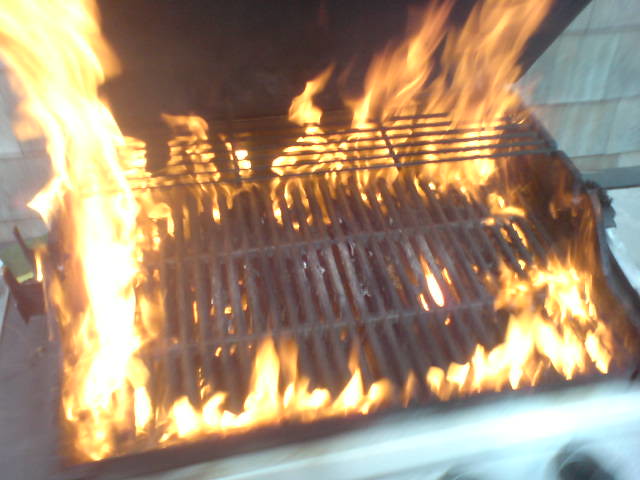
Grease Fires Can Be Scary!
This is NOT a photo of the actual grease fire I experienced recently, but it might as well be.
In early March 2022, I was vacationing with my extended family, staying in a rented house in a state park that included a Weber Genesis II E-325 gas grill. My brother volunteered to grill tri-tip roasts for our final dinner on Saturday night, so upon arrival Thursday I opened up the grill to inspect its condition.
What I found was a grill that was filthy dirty. There was a lot of junk below the cooking grates, but my focus was on the grates themselves. I ran the grill with all burners on high for 30 minutes (it belched lots of smoke), gave the grates a good scrub with a grill brush, then shut it down.
On Saturday night, I had the foresight to pull the grill away from the shingle-sided house before we started cooking. My brother pre-heated the grill and began cooking four large tri-tip roasts. About 10 minutes in, the dripping fat ignited the built-up stuff in the bottom of the grill and it broke into flames not unlike those shown in the photo above!
My brother quickly rescued the meat from the grill and turned off the propane. It took quite a while for the flames to die down, then we used a spatula to dig out as much debris as possible from under the grates, got the grill restarted and finished the cook.
In retrospect, this was a really dangerous situation. The park staff was not cleaning the grill between renters. As a vacationer, I was not prepared to do a deep cleaning on a grill that was not my own—I only paid attention to the condition of the grates. The grill resided on a deck next to a shingle-sided house with a shake roof in a forested area suffering its third year of drought. If all that doesn’t sound like a disaster waiting to happen, I don’t know what is.
Yes, I shared our experience with the park staff, and I hope they take seriously the need to keep that grill clean in the future—or remove it if they cannot do so.
How To Avoid A Grease Fire
Don’t take lightly the risk of a grease fire—be proactive to avoid one!
Be obsessed about grill cleanliness.
Pay close attention to the condition of the surfaces below the cooking grates, especially the grease tray and drip pan. Do not operate the grill if there is a thick layer of carbonized debris in the bottom of the grill or a pool of liquid grease in the drip pan. You’re better off ordering out for pizza than risking a dangerous grease fire!
Choose your grilling location carefully.
A raging grease fire can spread to your house, patio cover, dry vegetation, or other nearby flammable materials. It may be tempting to move a grill closer to your house during wind or rain or just for convenience—think safety first when locating and operating a gas grill.
Be prepared for a grease fire.
Keep the following items on-hand, just in case:
-
- A fire extinguisher, a box of baking soda, or a box of kosher salt.
- Leather grilling gloves that cover your forearms.
- Long tongs for pulling meat off the grill and a tray on which to put the meat.
What To Do In The Event Of A Grease Fire
Your first instinct will be to rescue the meat. Wrong! Your first priority is to turn off the gas. If you can do it safely using the burner control knobs, do that first, then turn off the gas at the source, whether at the propane tank or at the house valve if using natural gas. If the flames are so big and hot that you can’t do it safely using the burner control knobs, do it at the gas source first.
Next, quickly pull the meat off the grill using your tongs and leather gloves.
Next, throw the baking soda or kosher salt on the fire to extinguish it. Resist the temptation to apply water to the fire, it may splash burning grease over a larger area.
Next, carefully close the lid to deprive the fire of oxygen.
Use the fire extinguisher as a last resort, but don’t hesitate to use it, if necessary. If you are unable to put out the fire, or if it spreads to the area surrounding the grill, or especially if the propane tank becomes involved in the fire, leave the area immediately and call 911 for help.
Clean Grill & Check For Safe Operation Before Resuming Cooking
Most grills will survive even a scary looking grease fire. Before you start cooking again:
- Let the grill cool enough so you can handle parts safely.
- Clean out the inside of the grill enough to avoid another fire.
- Do a visual check to see if components, burners, valves, gas hose, etc. appear to be undamaged. If anything doesn’t look right, do not proceed and finish cooking your meat in the kitchen.
- If you can light the grill, proceed to finish your cook.
- Promise yourself that you’ll do a deep cleaning before your next cook.
Photo Credit: mroach on Flickr used under CC BY-SA 2.0.
